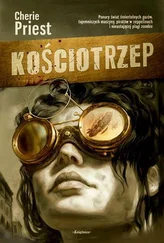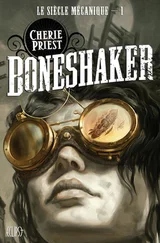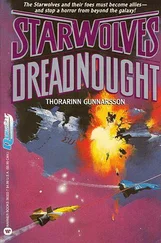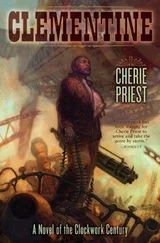Cherie Priest - Dreadnought
Здесь есть возможность читать онлайн «Cherie Priest - Dreadnought» весь текст электронной книги совершенно бесплатно (целиком полную версию без сокращений). В некоторых случаях можно слушать аудио, скачать через торрент в формате fb2 и присутствует краткое содержание. Год выпуска: 2010, ISBN: 2010, Жанр: Фантастика и фэнтези, на английском языке. Описание произведения, (предисловие) а так же отзывы посетителей доступны на портале библиотеки ЛибКат.
- Название:Dreadnought
- Автор:
- Жанр:
- Год:2010
- ISBN:978-0-7653-2578-5
- Рейтинг книги:3 / 5. Голосов: 1
-
Избранное:Добавить в избранное
- Отзывы:
-
Ваша оценка:
- 60
- 1
- 2
- 3
- 4
- 5
Dreadnought: краткое содержание, описание и аннотация
Предлагаем к чтению аннотацию, описание, краткое содержание или предисловие (зависит от того, что написал сам автор книги «Dreadnought»). Если вы не нашли необходимую информацию о книге — напишите в комментариях, мы постараемся отыскать её.
Dreadnought — читать онлайн бесплатно полную книгу (весь текст) целиком
Ниже представлен текст книги, разбитый по страницам. Система сохранения места последней прочитанной страницы, позволяет с удобством читать онлайн бесплатно книгу «Dreadnought», без необходимости каждый раз заново искать на чём Вы остановились. Поставьте закладку, и сможете в любой момент перейти на страницу, на которой закончили чтение.
Интервал:
Закладка:
She shuddered under her cloak, although it was not really cool enough to warrant it, and hustled away from the mission as fast as her legs could carry her.
This might’ve been a bad area of Memphis, or it might only be that it was dawn, and therefore both too late and too early for much traffic; but she found the city as unthreatening as most places, and less threatening than some. Perhaps Mrs. Gaines had been accustomed to a different standard of living up in Maryland. More likely, it occurred to Mercy as she glanced around, the other woman simply wasn’t accustomed to living amongst so many people who weren’t white.
Mercy stopped a small newspaper boy, unloading his wares onto the curb and setting up his sandwich board. The little fellow had rich brown skin, plus eyes and teeth that seemed unnaturally vital and white compared to the dying men upstairs a block away.
She said, “Boy, could you tell me how to get to the docks?”
He nodded, pointed the way, and gave her a few quick instructions. Like a good little capitalist, he added, “And you can have a paper for just a couple pence ’federate.”
A quick glance at the headlines revealed words like union lines, Chattanooga, civilian crash, and Dreadnought . Since many of those things had had such a recent impact on her person, Mercy said, “All right,” took the paper, and handed the boy some change. She rolled the purchase up and stuffed it into her satchel, then followed the child’s instructions down to a river district that startled her with its size and complexity.
Between the boats, the boardwalks, the businesses, and the early-morning bustle of commerce beginning, Mercy could see the river in slivers and peeks. She’d heard stories about the Mississippi. Hadn’t everyone? But to see it in real life was to be astounded by the sheer breadth of the thing. By comparison, every other waterway she’d ever passed had been a stone-skip across. This one-and she saw it better when she brought herself across the street, dodging a pair of carts overflowing with cargo-seemed all but endless. Standing as near to the edge as the civilized crust of the city would let her stand, she still could not see the other shore through the morning mists.
She held her hand up to shield her eyes, but since the sun was still rising behind her, the hood of her cloak served the same purpose when she turned around to take in the scenery.
The strip was thick with cotton retailers and distributors, their signs swinging back and forth with every gust of wind coming high up off the water to the bluff where the city was built. Down the street she saw piles of crates with stenciled labels that declared COCOA, COFFEE, and BULK CLOTH. Men haggled, bartered, and bickered with one another, either arranging for transport for items freshly delivered or seeking a ride to someplace else.
She scarcely knew where to begin, so she asked a woman sweeping a stoop which way she might walk in order to buy passage on the river. The broad-waisted shopkeep thought about it a moment and said, “Go down that way, past the next couple of streets, down the bluff to the port proper, and ask about the Anchor Line. Them’s the boats what run up and down the river most often, taking people as much as cargo.”
Mercy followed her instructions, and in another twenty minutes found herself standing at the docks for the Anchor Line steamers, only to realize that she couldn’t possibly afford to take one. Every boat was a floating palace of white gingerbread with gold trim, red paddles, and polished whistles that glinted in the lifting dawn. But this was just as well, because from Mercy’s new vantage point, she could see a big REPUBLIC OF TEXAS RIVER TRANSPORT STATION sign strung up between two huge columns shaped like the pumps that dredged up the wealth of that nation.
The Providence was right past the pumps, low in the water, God-knew-what filling its cargo hold and a big Lone Star flag flying beside the topmost whistles above a red-and-blue-painted paddle wheel at the stern. It lacked the gingerbread and polish of the Anchor Line crafts, but its design appeared sturdier, more ready to face a fight with a cannon instead of a gloved hand. Maybe it was the set of the prow, like a bulldog’s jaw; or maybe it was the gray paint job and straight, unfrilly lettering on the side that announced the vessel’s name.
Mercy pulled her cloak’s hood back so that her hair hung almost loose, having halfway fallen from the bun she’d put it in an hour earlier. The breeze off the river felt cool and smelled bad, but it was fresh air, and it didn’t carry even a whiff of gunpowder-just the occasional flash of petroleum fuel, which reminded her of the mechanized walker outside Fort Chattanooga.
She approached the dock and stood anxiously, not knowing what to do next. Broad-shouldered colored men in plaid cotton shirts hefted crates to and fro, two men to a crate, and a pallid white man with a stack of papers was bickering with another man who held another stack of papers.
From behind her, a voice asked, “Hey there, ma’am. Can I help you with something?” in a Texas accent that could’ve stopped a clock.
The speaker wore a hodgepodge outfit that was one part Rebel grays, one part western ranch wear, and one part whatever he’d felt like putting on that morning. His mustache and sideburns were blond once, but had faded on to gray in such a fashion that they grew the consistency and color of a corn tassel.
“Er . . . yes. I think. Thank you, sir,” she said. “I’m Mercy Lynch, and I’d like to buy passage aboard this boat.”
“This ship in particular? That’s right specific of you.”
“I was referred to the Providence by Mrs. Henderson, who I met on a dirigible from Richmond. She told me the captain was her brother-in-law, and he might treat me kindly if I could pay my way. And I can. Pay my way, I mean.”
“Adora? On a dirigible? You can’t be serious.”
“Her first name’s Adora?” Mercy responded.
“It fits her about as well as a glove on dog’s ass, don’t it?”
“I wouldn’t go so far as to say that -”
His face bloomed into a smile that stretched the full length of the mustache. “That’s all right. You’re not family, but I am, and I don’t just say it, I declare it.”
She guessed the obvious. “So that must make you the captain? Captain . . . I’m sorry, she only called you Benham, and I won’t presume.”
“Captain Benham Seaver Greeley, at your service, Nurse. You are a nurse, ain’t you? I’ve seen that cross before. Salvation Army, isn’t it? Or no.” He shook his head. “Something else. But I’ll be damned if I can recall just what.”
“I’m a nurse, yes. With the . . .” She brandished the ornamented side of her satchel. “With the Red Cross. The organization’s very popular in Europe. Miss Clara Barton is trying to establish a solid presence here in the Americas, too.” She did not add that she was not strictly a member of this agency, in case it would’ve mattered.
“But that’s a little like the Salvation Army, right?” he asked, still trying to get a handle on precisely where the situation stood.
“I guess. I mean, I’ll treat anybody who needs treatin’, and I try not to look at the uniforms. But,” she added quickly, “I’ve been patching up our boys for the last few years. The Rebel boys, I mean. And a few Texians, too.”
He nodded, as if this made sense, or at least it didn’t confuse him any. “And now you’re moving on, to patch up some other boys? I don’t know if Adora told you or not, but our run’s between St. Louis and New Orleans.” He said New Orleans in two syllables: Norleans . “Our afternoon run will put us in Missouri by the end of next week, so if you’re looking to head down to the delta, you may want to wait for the return trip at the end of the month.”
Читать дальшеИнтервал:
Закладка:
Похожие книги на «Dreadnought»
Представляем Вашему вниманию похожие книги на «Dreadnought» списком для выбора. Мы отобрали схожую по названию и смыслу литературу в надежде предоставить читателям больше вариантов отыскать новые, интересные, ещё непрочитанные произведения.
Обсуждение, отзывы о книге «Dreadnought» и просто собственные мнения читателей. Оставьте ваши комментарии, напишите, что Вы думаете о произведении, его смысле или главных героях. Укажите что конкретно понравилось, а что нет, и почему Вы так считаете.










